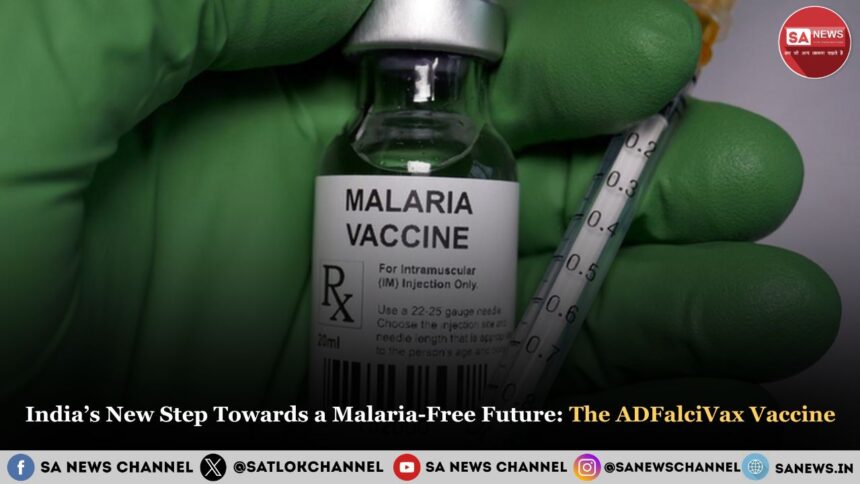India has been making significant efforts to curb the spread of malaria, and there is now an important advancement in this area. A new vaccine candidate named ADFalciVax is under development. This could bring the country closer to its aim of eradicating malaria by 2030.
The name may seem a little complicated, but its purpose is straightforward: it aims to prevent malaria from causing damage. For decades, malaria has been a silent enemy, especially in regions where healthcare access is limited. While progress has been made through various preventive measures, a successful vaccine could truly transform the fight against this deadly disease.
What is ADFalciVax?
The ADFalciVax vaccine aims to combat Plasmodium falciparum, which is the most lethal type of malaria parasite. Unlike previous approaches that target only one phase of the disease, this vaccine attempts to interrupt it at multiple stages. This complexity makes it more difficult for the parasite to thrive and disseminate within the body.
Scientists refer to this as a “multi-stage” vaccine. In layman’s terms, it operates at various points in the infection process to offer enhanced protection. This multi-stage approach is crucial because malaria is not a simple infection. It undergoes various transformations in the human body — from the liver to the bloodstream and beyond.
Also Read: Scientific Experiments: Meaning, Types, Methods, and Real-Life Applications
Blocking it at multiple phases provides a stronger shield against infection, making it harder for the disease to take hold or spread further.
If successful, this vaccine could fill a significant gap in current malaria prevention strategies, which heavily rely on mosquito control and medication.
Who is Behind This Work?
This vaccine is being created by researchers at the International Centre for Genetic Engineering and Biotechnology (ICGEB) in New Delhi. They are collaborating with Sun Pharma, a leading pharmaceutical firm in India.
This partnership between a reputed scientific institute and a pharmaceutical giant is a powerful combination, bringing both cutting-edge research and industry expertise together.
The project also has backing from the Department of Biotechnology, indicating that the government is committed to this initiative. Such collaborations between the government, scientists, and private companies highlight how serious India is about tackling long-standing health issues like malaria.
Moreover, the involvement of government bodies ensures that this vaccine won’t just remain in laboratories. If successful, there will be a clear pathway for it to reach those who need it most — the millions living in malaria-endemic regions.
Why This Matters
Malaria still impacts many individuals across India, particularly in rural regions. It can lead to fever, fatigue, and in severe instances, death. Although other interventions such as mosquito nets and medications have been beneficial, malaria is still a significant issue.
Beyond the obvious health impacts, malaria affects productivity, education, and livelihoods. Children miss school, adults lose valuable workdays, and healthcare systems are stretched thin dealing with preventable cases. In a country like India, where rural populations already face healthcare challenges, reducing the burden of malaria can have ripple effects in improving overall quality of life.
If this vaccine proves to be both safe and effective, it could greatly decrease the number of cases. Additionally, it might reduce treatment costs and enhance safety in regions where malaria is prevalent. A successful vaccine would mean fewer hospital visits, less reliance on expensive medicines, and reduced strain on healthcare workers.
Looking Ahead
India has improved its malaria control efforts over the years, but there is still more to achieve. With ADFalciVax, the nation might make significant advancements. However, the vaccine must complete clinical trials and additional assessments before it can be used broadly.
The journey from development to deployment is not quick. Clinical trials must ensure the vaccine is not only effective but also safe across different age groups and populations. Regulatory approvals, manufacturing, and distribution logistics will follow. Yet, if all goes as planned, it could assist India and other nations facing serious malaria challenges.
Success here could also inspire similar innovations for other neglected tropical diseases that continue to affect millions across the globe.
Conclusion
The creation of the ADFalciVax vaccine is a significant indicator of progress in health research in India. It demonstrates that Indian scientists and institutions are collaborating to address genuine issues. This effort goes beyond a single medicine — it contributes to a broader aim of improving the nation’s health.
By maintaining support for this type of research, India is advancing towards a future where diseases such as malaria are not a constant danger. This vaccine symbolizes hope not just for India but for other malaria-endemic countries too. It’s a reminder that through collaboration, dedication, and innovation, even age-old problems like malaria can be tackled head-on.
As citizens, healthcare professionals, and policymakers await further developments, ADFalciVax stands as a beacon of what India’s scientific community is capable of achieving for the greater good.
According to Sant Rampal Ji Maharaj, the ultimate purpose of human life is not just to attain freedom from diseases or achieve material progress but to attain liberation from the cycle of birth and death through true devotion (Satbhakti).
However, serving humanity through efforts like the ADFalciVax vaccine is also a virtuous deed when done with good intentions. Sant Rampal Ji Maharaj emphasizes that just as physical diseases harm the body, the real disease of the soul is ignorance, which can only be cured through the true Naam (Satnaam and Saarnaam) given by a complete Saint.
While scientists are trying to protect the body through multi-layered vaccines, true spiritual practice protects both the inner self and the outer life. Thus, along with medical advancement, adopting true spiritual knowledge is essential for complete well-being and eternal peace.









